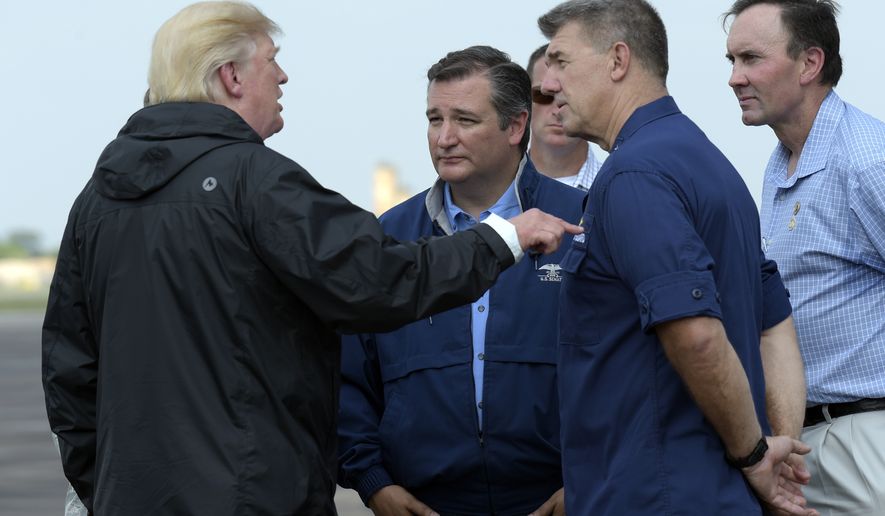The Trump administration told Congress on Sunday to “put politics aside” and attach funding for Hurricane Harvey recovery efforts to a bill to lift the debt ceiling, putting it at odds with House conservatives who specifically warned GOP leaders not to link the efforts.
President Trump, who mingled with storm victims during a second stop in Texas on Saturday, is requesting nearly $8 billion as a down payment on federal assistance for flood-ravaged Houston and other parts of southeast Texas. Ultimately, the price tag for the recovery could exceed $100 billion.
Pressed on “Fox News Sunday,” Treasury Secretary Steven Mnuchin flatly said he couldn’t reassure conservatives who want to divorce the Harvey money from efforts to lift the government’s borrowing limit.
“Quite the contrary,” he said. “The president and I believe that it should be tied to the Harvey funding. Our first priority is to make sure that the state gets money. It is critical. And to do that, we need to make sure we raise the debt limit.”
Mr. Mnuchin said failure to lift the debt limit would hinder his ability to secure funding for the relief effort.
“Without raising the debt limit, I’m not comfortable that we will get the money that we need this month to Texas to rebuild,” he said. “And I think as you know, that’s our priority. We need to help the people in Texas, and we need to get that done.”
SEE ALSO: Harvey’s floodwaters mix a foul brew of sewage, chemicals
Texas Gov. Greg Abbott on Sunday said the price tag for Hurricane Harvey relief could reach as high as $180 billion, arguing the devastated population and area is “far larger” than ones swamped by Hurricane Katrina and Superstorm Sandy in years past.
He warned that waters are still rising around Beaumont and other parts of Texas, though many folks are beginning to come to grips with Harvey’s toll, ripping out dry wall and flooring as they tally up their costs.
“This is where we come to the part where Congress plays a role,” Mr. Abbott told “Fox News Sunday.” “We need Congress to step up and pass that to help Texas rebuild.”
House Freedom Caucus Chairman Mark Meadows has said that approving Harvey money is important, though attaching it to a separate bill such as the debt-ceiling effort would “be inappropriate and send the wrong message.”
His conservative group has regularly pushed for spending cuts in conjunction with measures to extend borrowing authority.
Sen. Roy Blunt, Missouri Republican, told NBC’s “Meet the Press” that tying Harvey funding to the debt ceiling is one way to get it done, yet leaders will “need to look at how the votes come together to make that happen.”
Indeed, the debt limit has become another political quagmire ahead of a jam-packed September calendar, with Democrats signaling they will put the onus on the GOP majority to pass a clean debt-ceiling bill before the end of the month.
In a joint statement, Senate Minority Leader Charles E. Schumer and House Minority Leader Nancy Pelosi signaled they’re on the same page as Mr. Trump in their approach to Harvey money.
“Providing aid in the wake of Harvey and raising the debt ceiling are both important issues, and Democrats want to work to do both,” they said. “Given the interplay between all the issues Congress must tackle in September, Democrats and Republicans must discuss all the issues together and come up with a bipartisan consensus.”
Congress this month also needs to post funding to keep the government open beyond Oct. 1, reauthorize the Children’s Health Insurance Program and explore fixes to Obamacare, among other things.
Harvey funding itself is a bit of a political football.
Texas Republicans who voted against roughly $50 billion in relief funding for Superstorm Sandy in 2012, citing items on the bill that were unrelated to the storm, are facing backlash from Northeast Republicans who say they won’t turn their backs on Texans who are the ones asking for help this time around.
Mr. Abbott said the devastation from Harvey will exceed that of Hurricane Sandy and the well-documented Katrina disaster in 2005 but that the federal government is just one part of the relief effort, highlighting a fund called RebuildTX.org and life-saving efforts by everyday Texans on the ground.
Houston Mayor Sylvester Turner said his top priorities are funding for debris removal, “housing, housing, housing,” and expedited assistance for first responders who’ve been helping others but face their own challenges at home.
At the same time, he said the drinking water is safe, the electric grid is mostly functional and airports and public transit systems are up and running.
He said he expects most employees to return to work Tuesday, and that concerts, conferences and other sporting events should proceed. “The city of Houston is open for business,” he said.
At the federal level, FEMA Administrator William “Brock” Long on Sunday said the government is shifting its focus to yet another hurricane — Irma — even as it helps Texas recover.
Mr. Long said his agency has deployed management teams to Puerto Rico and the U.S. Virgin Islands to prepare for the approaching system, which has strengthened to a category-three storm as it approaches the Caribbean.
U.S. officials say it’s important to prepare now, as Irma charts its path.
“Good to start thinking now about #HurricaneIrma plans,” Sen. Marco Rubio, Florida Republican, tweeted. “Think through what you will need to do if your area is placed on watch late next week.”
• Tom Howell Jr. can be reached at thowell@washingtontimes.com.




Please read our comment policy before commenting.